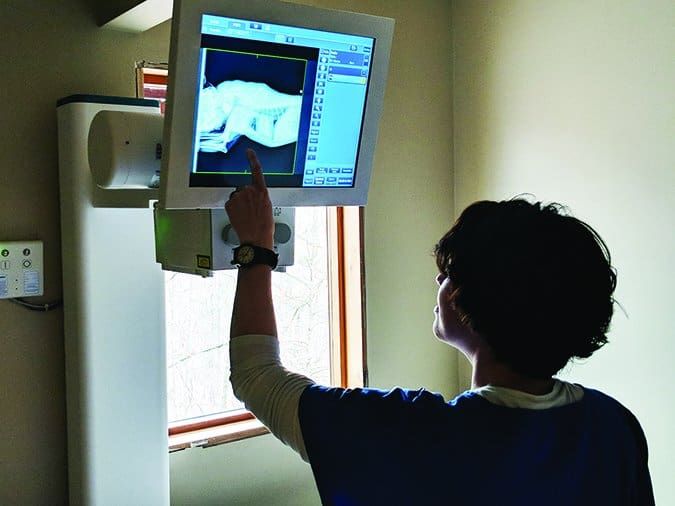Our dogs are part of our families. They play, run, and sleep with us. From bouncy puppies to laid-back adults, we are partnered for life. But what happens when they can no longer keep up? Often, as our dogs age, we start to see a general “slowing down.” Most owners see this as a normal part of growing older and it’s frequently written off. But what if it’s a sign of something more?
There are a number of ways that we can stay on top of health issues that creep up on our dogs with age. Annual veterinary visits are a staple in every healthy pet’s life. A comprehensive physical exam from nose to tail is step one in picking up clues to underlying concerns at every age, but it becomes even more important in the senior years.
In general, a senior pet is thought of as one in the later third of its life. So for our giant breed friends, this could be as early as four or five years of age, while those little Chihuahuas don’t hit senior until 10 or older! It’s at this point that your vet may start recommending biannual physical exams and other regular diagnostic tests to detect concerns as early as possible. As we’ve all heard from our own doctors, early diagnosis is key to successful treatment. Let’s look a little closer at some of those screening tests that may be recommended for your aging dog.

Recommended Screen Tests for Older Dogs
Complete Blood Count
What it is: The complete blood count, or CBC, is a blood analysis that investigates the red and white blood cell lines, as well as platelets. Red cells are the oxygen-carrying cells of the body, providing important nutrients to all of the organs and tissues. White cells are often thought of as our infection-fighting cells and while that’s definitely a big part of their job, they also give indications of overall immune health. Platelets are part of the blood-clotting system. The CBC takes in the number of each type of cell, as well as their sizes and distribution in the total volume of the blood.
Why run it: This is a screening test. That means that it rarely holds up a big sign with a diagnosis on it. Instead, the CBC is an indicator of underlying problems. A low red blood cell count (often called a packed-cell volume or hematocrit) means something is bleeding, something is damaging/consuming red cells or the body isn’t producing enough. A high count can point toward dehydration. A small change up or down may make your dog sluggish, which owners frequently misinterpret as “getting old.”
These little changes can point your vet toward an underlying disease process that may be treatable, helping your dog reclaim his youthful energy! A change up or down in the white blood cell lines may indicate an underlying infection (dental disease, anyone?), inflammation (how about those spring allergies?) or even be an early sign of certain cancers.
When it should be run: An annual CBC is a part of a comprehensive exam at any age, but in senior pets, every six months will help pick up changes as soon as they happen. As with any test, if your dog is showing signs of illness, even if you just had a CBC run last week, it should be checked!
Blood Chemistry
What it is: A blood chemistry is a broad term for any test that evaluates how the body’s organs are functioning. These come in many varieties and are frequently followed by a number such as 12, 19, or 23. This number indicates how many different parameters are being tested, so for the most information, look for the test with the highest number!
Values that are most frequently included on a chemistry are liver enzymes, kidney-function measurements, blood proteins, and blood sugar. Other values that are sometimes included reflect pancreatic function, electrolytes, and gallbladder function. Get more details on common canine blood chemistry values here.
Why run it: These values point your veterinarian in a specific direction. If your pet is seeming “older,” that may be a reflection of lethargy, which in turn may be a result of liver disease or something similar. Sometimes, a chemistry test gives us an answer, such as in the case of elevated blood sugar in diabetes. In other instances, it indicates where to look next, such as when liver enzymes are elevated. This test gives you a lot of “bang for your buck.” It gives a lot of information in a relatively non-invasive way and for a small price tag. Normal values are great, too! When we have a test with normal values, we can more accurately interpret a change in the future. The best part of a chemistry is that there are instances where it can give you a diagnosis. While it is useful as a screening test, it can also be a test that gives you an answer.
When it should be run: Chemistry panels are similar to a CBC, in this respect. They should be run every six months or any time something changes. When early changes to liver or kidney health are detected, sometimes we can use something as simple as diet to manage things. If left undiagnosed for a year or more, our options become much more limited.

Thyroxine Screen (T4)
What it is: The T4 or fT4 is an abbreviation for a specific thyroid hormone. It is how vets often refer to a thyroid screen. This test looks at circulating thyroid hormone (T4) or circulating, unbound thyroid hormone (fT4 or free T4). T4 is one of several thyroid hormones produced by the body. It is the easiest and most inexpensive to test, but it is a screening test; an abnormal value requires follow-up testing.
Your dog’s thyroid gland secretes several hormones that are responsible at least in part for regulating a multitude of things, including metabolism, energy level, even skin health!
Why run it: Hypothyroidism, a condition in which the thyroid gland does not produce adequate hormone, is one of the most commonly diagnosed conditions in older dogs. It causes pets to just seem old – they become lethargic, overweight, have poor hair coat, and can have appetite changes. Often, these changes are subtle and are easily attributed to “old age.”
This condition is also one of the easiest to treat! It only requires supplemental thyroid hormone. This is inexpensive and usually easy to give (what dog doesn’t like peanut butter?). It can really change a dog’s life when you get that balanced out! As anyone with thyroid disease themselves can attest to, when thyroid hormones are off, you feel crummy.
When it should be run: Generally, a yearly thyroid screen is sufficient for most dogs. If it is abnormal, your veterinarian may recommend a more in-depth panel to fully diagnose the condition or may simply recommend monitoring this screen more frequently. It all depends on your dog’s specific situation.
There is a caveat to this test. Thyroid hormone is a finicky thing. If your dog is sick in some other way, his thyroid hormone value may be artificially lowered. This is a condition called “sick euthyroid” and is not true hypothyroidism. This is why the confirmatory panel is so important to run. Be sure to follow your veterinarian’s advice when it comes to starting supplementation or running additional tests.
Urinalysis
What it is: The urinalysis, often abbreviated UA, is exactly what it sounds like: an evaluation of your dog’s pee. Urine is a great indicator of a lot of different conditions. We evaluate urine for protein content, pH, crystals, cells, and a whole host of other things. Each bit of information provides insight into your dog’s overall health.
Why run it: When your veterinarian asks for a urine sample, it’s not always to look for infection. Basic urine screens, as part of a comprehensive exam, can give signs of diabetes, early kidney disease, bladder stones, even bladder or prostate cancer. The urine is a sensitive marker for these things and we frequently see changes to it before seeing changes to blood tests. Dilute urine or urine with a high protein content may be reflective of kidneys that aren’t working as well as they should. A high sugar content means diabetes.
Of course, it’s always good to look for infection, too! Bacteria can be a normal part of urine that was caught via “free catch” (straight from the stream, as it were!), but if the sample was obtained in a sterile method, lots of bacteria means infection. Sometimes, after running a blood profile, your veterinarian will ask for a urine sample. It’s important to interpret these tests together to get all of the puzzle pieces.
When it should be run: Annual urinalyses are a great place to start in a senior dog with no obvious health concerns. If something abnormal pops up, your veterinarian will recommend a monitoring plan tailored to your dog. If a blood analysis shows something funky, a urine sample may be requested to get more information.
If your four-legged friend is ever exhibiting signs of a urinary-tract problem, such as increased frequency of urination, straining to urinate, or blood in the urine, see your vet and be prepared to check a urine sample!
Pro-tip: If you think your dog is straining to poop, he may actually be straining to pee! Come to your vet appointment with a urine sample in addition to a fecal sample and your vet will be impressed!
Thoracic Radiographs
What it is: Radiograph is the fancy word for an x-ray. Thoracic (chest) x-rays are a great tool to assess your dog’s health. An x-ray can frequently be taken on an awake patient, but if your furry friend is a bit nervous, sedation provides a safe and effective way to take perfect pictures.
Dr. Kyle Grusling

Chest x-rays allow your veterinarian to evaluate the lungs and heart, as well as portions of the spine, trachea, esophagus, and sometimes even the first part of the abdomen.
Why take them: One of the most frequent things veterinarians hear from clients with older dogs is “he’s just slowing down!” When that happens, it can mean any number of things that are tough to puzzle out.
In some cases, a dog’s reluctance to play fetch may be related a difficulty catching his breath. Chest x-rays give a peek into heart and lung conditions that affect energy level, breathing, and comfort. These include primary heart disease, asthma, allergies, even cancer.
The “Big C” is a word that dog owners never want to hear, but our pets are not immune. Lungs are a frequent spot that cancer spreads. We can see spots in the lungs, called metastases, as a sign that cancer is occurring somewhere in the body. Primary lung and heart tumors also happen and can be picked up with x-rays.
When to take them: Chest x-rays taken yearly, as well as before any anesthetic procedure, will provide your veterinarian with important health information. Knowing your pet has a happy heart and healthy lungs can provide a measure of comfort to you, as well.
Worth the Extra Effort and Expense
Senior dogs are great companions. Whether they came into our lives as puppies or were adopted in their twilight years, we want to keep them comfortable and healthy for as long as possible. The screening tests discussed here are the first step in early disease detection. While it looks like a lot of information and a lot of poking and prodding, most of these tests can be run using just a small sample of blood and urine.
Don’t ever dismiss your senior dog’s behavior change as “just” old age; even if he is getting old! Sure, we all enjoy a snooze in the sun and maybe we don’t lose that winter weight as easily as we did in our younger years, but in our dogs, these can be signs of easily treatable problems. You and your veterinarian can custom design a screening program for your senior dog to ensure a long, healthy life.
Next month, I will discuss “next step” tests, including abdominal ultrasound, echocardiograms, ECGs, and full thyroid panels.
After graduating from Michigan State University College of Veterinary Medicine in 2011, Kyle Grusling had internships in small animal clinical medicine and surgery, then practiced emergency medicine for three years, before deciding to pursue a career in general practice at Northland Animal Hospital in Rockford, Michigan. When she’s not at work, Dr. Grusling enjoys spending time with her husband, Joe, two sons, Mason and Beckett, as well as their two cats and their Golden Retriever.







Unfortunately, the link to your first story “When Seniot Dogs Act Like Grumpy Old Men’ takes the reader to your second story ‘Physical Exams for Senior Dogs’. As a food goddess of a 13 year old Grumpy Old Man, I would love to see the rest of your first story! Is there a fix for this?
Thanks for the work you do. I have subscribed since your first issue and introduced The Whole Dog Journal to many other dog owners.
Click on the Blog button and you will find. I want to finish the story, too!
Blog button? Guess I get the Grandson to help me find that – sigh
I also would like to read the rest of Nancy’s blog. Please re-direct the link!
go to top of the page right hand side and you will see the link to the blog article
I’m looking for opinions from other older pet parents!! My last week-and-a-half has been absolutely terrible with my 11-1/2 year old Bichon Frise (up to this point, total puppy still). Went for her semi-annual check-up last Monday. Kidney function comes out fine in CBC but she is throwing protein in her urine. Come home, take off her harness (secures her to seat), get out of car, turn to pick up dog, she pushes past me and jumps out. Next thing I know she’s on her back 4 feet from the car. Get her back to vet on Tuesday, she’s ruptured her CCL. I have started laser treatments and physical therapy, joint support supplement, and fish oil, gabapentin. On Sunday she starts urinating blood, very little urine, mostly blood. Trip to emergency vet hospital. Poor baby now has a urinary infection. My question to fellow pup parents, how have you dealt with a ruptured CCL on an older dog. I feel that surgery with her issues is not a good idea. But rather pursue a brace for her, and continue the physical therapy.
My lab tore her ccl and when we did bloodwork prior to surgery she came up with a low platelet count. Saw an internal med dr and they found nothing wrong. My research came across bone marrow soup as a means to increase platelet count. Couldn’t hurt to try it- it worked. We went back 4 months later labs were good and her knee was stable! She just had bloodwork done for eye surgery so we’ll see how her levels are.
I would like to read grumpy old men too
https://www.whole-dog-journal.com/blog/when-senior-dogs-act-like-grumpy-old-men/
Please repost the article, “Grumpy Old Dogs.” It disappeared before I had finished reading it. Seemed very informative as well as quite readably personal.
My cousin has been thinking about getting an ultrasound for her golden retriever because she thinks that she is pregnant. She would really like to get some help from a professional to work a lot safer. Making sure that they have the right equipment to be more effective could be really useful.
Thank you for explaining that a CBC can help you to determine if your dog is really getting old or is just dehydrated. I didn’t realize that your dog’s blood could tell you that much. We’ve noticed that our dog is starting to slow down but after reading this, I want to be absolutely certain. We’ll take him to see our vet as soon as we can.